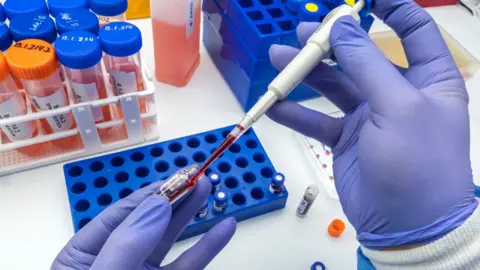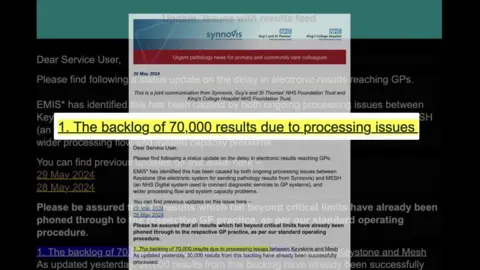BBC News Investigations
 Getty Images
Getty ImagesAn NHS provider that won a £2bn contract to deliver blood-testing services for hospitals and GPs is failing to deliver reliable results, according to medical professionals.
Synnovis, a public-private partnership between the medical company Synlab and Guy’s and St Thomas’ and King’s College hospital foundation trusts, secured the contract in 2021 to deliver pathology services for just under 200 GP surgeries across south-east London.
The BBC has spoken to GPs who say incorrect and delayed blood results are a “regular concern” and that the firm’s performance is causing great distress to patients.
Synnovis said it was “incredibly sorry for the inconvenience and upset caused to those affected”.
‘National scandal’
The company, which fell victim to a ransomware cyberattack in June 2024 that caused more than 1,000 NHS operations to be postponed, said the attack had “significantly reduced our capacity to process samples”. Synnovis, which serves six hospitals in London, added that it had “dedicated every available resource to delivering clinically safe and largely manual interim solutions”.
According to more than a dozen GPs we heard from, across all of south-east London’s boroughs, the severity of challenges they face under Synnovis is causing anxiety for both patients and doctors.
The GPs told the BBC that the blood-test issues were leading to unnecessary hospital referrals and wasted patient appointments. In one case the BBC was told about, an elderly man who was caring for his wife with dementia needlessly spent hours in accident and emergency (A&E) due to problems with his test.
One GP, who spoke to the BBC anonymously, said: “It would [previously] never cross our minds that a blood test might not be reliable. This is now an everyday concern.
“The current problems with Synnovis is nothing short of a national scandal,” they added.

Kemi, a 17-year-old college student, started to experience heart palpitations, breathlessness and fatigue six months ago.
Unable to attend college because of her health issues, in November she sought an appointment at her GP surgery, which relies on Synnovis for blood testing.
When the results came back, she was told there was a problem. “I found out there was something wrong with the blood test – my potassium was too high, which is not normal,” she said.
However, Kemi said her GP told her that her potassium levels were not actually high, but that this result was found because her blood sample had coagulated as it had waited too long to be processed.
When she received her results on the NHS app – which the BBC has seen – it said they were “invalid due to laboratory error”. Kemi said the situation had left her “frustrated, sad and confused”.
“I’m really stuck. I’m depressed, I’m anxious that something’s going to happen to me before I get a diagnosis,” she told us. “I am worried that I am going to end up seriously hurt because I can’t get the diagnosis I need.”

GPs have told the BBC that unreliable blood results, with erroneously high levels of potassium caused by processing delays, are a regular occurrence since Synnovis began the service.
High potassium levels in the blood can point to serious health issues, such as heart problems.
Because of this, GPs say they cannot ignore blood-test results that indicate high potassium – even if they believe them to be incorrect – and they are obliged to refer patients immediately to A&E.
GPs say these patients are often turned away after being retested at hospital, where normal potassium levels are discovered.
‘I couldn’t reassure them’
It is an issue Dr Shah – not his real name – says he experiences on a weekly basis.
“If the potassium level is above six it can cause problems with the heart and heart rhythm disturbances that could potentially prove to be fatal,” Dr Shah said. “It’s an urgent thing that needs to have the sample repeated and to make sure the result is genuine or a false reading.”
Dr Shah, who has been a GP for nearly three decades, said the frequency of elevated potassium in blood results had been unusually high at his surgery in recent years.
“It turned out that there were delays in the collection of samples from the GP surgeries, then to the labs… delays in processing in the labs, which was causing the results to be high,” he said.
Dr Shah told the BBC he recently had to send a man in his 80s to hospital as his potassium level appeared elevated on a Synnovis blood test. He explained that the patient had come to the surgery with his wife who had dementia and his daughter, and the family were concerned about long waiting times at A&E that evening.
“I had to say to them they shouldn’t leave it until the next day because whilst I thought it was normal, I couldn’t reassure them,” Dr Shah explained. At hospital, the patient’s potassium level was eventually found to be normal and he was discharged.
Dr Shah added: “I’m probably sending a couple of patients to A&E a week because of results I suspect to be faulty. Since Synnovis took over pathology services for south-east London, it’s pretty much been a catalogue of disasters.
“We’re almost second-guessing the pathology system and it’s something that never used to happen.
“You go to a shoe shop, you expect to buy a pair of shoes; you have a pathology service, you expect accuracy and reliability. That’s not happening.”

Dr Shah’s account is not a lone one.
A range of claims has been made by the 14 GPs we have heard from – who all wanted to remain anonymous for professional reasons.
One GP told the BBC that the increased workload resulting from having to assess and then escalate unreliable results was leading to “increased burnout and people wanting to leave the profession”.
Several GPs told of recent instances where they were unable to do timely diabetes tests for patients because of Synnovis delays.
Londonwide LMCs (local medical committees), the body that represents and supports GPs across the capital, said the problems with blood-test delays and inaccuracies experienced by GPs in south-east London were not consistent with the pathology service across other parts of the city.
“We have never had so many emails and questions, apart from the beginning of Covid, about one particular thing, from one area in London, said Michelle Drage, CEO of Londonwide LMCs.
“This is happening on a daily basis, on a clinic-by-clinic basis,” she added.
Acknowledging the impact the problems have had on the morale and workload of GPs, Dr Drage said: “We do not believe we can rely on Synnovis for accuracy. Our GPs have lost faith and trust in that service – that’s a horrible situation to be in.”
In October, Londonwide LMCs escalated its concerns to the Southeast London Integrated Care Board – the body charged with holding to account the NHS hospital trusts partnered with Synnovis.
Dr Drage said the written response it received was “unsatisfactory”.

As well as hearing the testimony of doctors, the BBC has seen dozens of Synnovis emails, sent to GPs from 2021 to the present day, apologising and attempting to account for various pathology problems, for instance regarding tests for malaria and diabetes.
One email showed Synnovis apologising for a backlog of 70,000 test results in spring 2024 – before the cyber-attack.
Dr Jayne – not her real name – explained that it took Synnovis a month to discover the backlog and begin to address it. “It’s really difficult to quantify that problem… 70,000 worries,” the GP of nearly 20 years told the BBC.
“It’s really stressful. We try to protect our patients. I feel like I’m constantly apologising for the system. It’s not my fault. We really want to be getting on with our work properly and not managing Synnovis’s errors.”
Southeast London Integrated Care Board said in a statement that tests requested by south-east London GPs alone amounted to about 10,000 a day, “with a number of logistical steps involved, from blood taking through to results reporting”.
It said there had been “a number of incidents” since Synnovis took on pathology services for south-east London that had been driven by a “number of factors, including incidents that have impacted on the Synnovis service but which were outside of their control”.
The statement continued: “You will also be aware that one of these incidents was a criminal cyberattack, the response to which was an extraordinary effort from multiple partners, including Synnovis, to maintain a viable service for our GP colleagues, while Synnovis undertook the significant task of rebuilding their systems from the ground up.”
According to a statement released by NHS England in October, 10,152 acute outpatient appointments and 1,710 elective procedures were postponed as a result of the cyberattack.
The statement said: “The final stages of recovery following the cyber attack on pathology services provider Synnovis in June are almost complete, which means nearly all services are now up and running.”
‘Extremely challenging’
In its statement, Synnovis said it offered more than 6,000 different types of test, serving almost two million patients, six hospitals and 191 GP practices across 249 sites.
“While we understand that any error at all can cause patient and practitioner distress, erroneous Synnovis tests account for significantly less than 0.001% of the 150,000 tests we process per day.”
However, these figures appear to include all Synnovis testing, including urine tests.
Synnovis added in its statement: “The provision of Synnovis’s pathology services for GPs is enabled through a range of test-request and results systems and software, a significant portion of which predates the Synnovis contract and are provided by legacy third-party suppliers.
“We are very aware that this has been an extremely challenging and sometimes distressing period for patients and front-line NHS colleagues and are incredibly sorry for the inconvenience and upset caused to those affected.”
For college student Kemi, her recent experiences have made her lose confidence in the health service.
She said: “I feel like as a young person, not being able to have access to reliable results sets the precedent that I can’t have an independent health journey as a 17-year-old. It’s hard to know where I can go from here.
“It might seem like it’s just a blood test but it’s serious. It can be a matter of life and death.”






